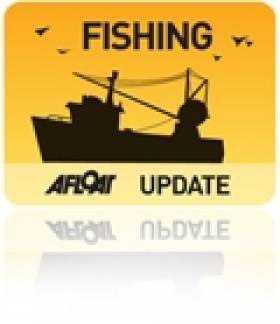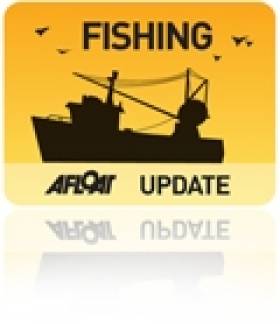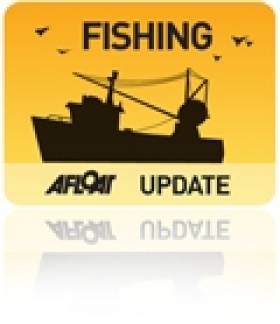Displaying items by tag: discard
Ireland Welcomes Agreement on Fish Discards
#discards – Minister for Agriculture, Food & the Marine, Simon Coveney TD today welcomed a new Regional Agreement (brokered by Ireland) to reduce the wasteful discarding of unwanted fish. The North Western Waters (NWW) Group of Member States (Ireland (Chair), Belgium, France, the Netherlands, Spain and the United Kingdom) has unanimously agreed on a Discards Plan that will cover all of the waters around Ireland as well as the Channel that will come into effect from the 1st of January 2016.
Minster Coveney said "During the negotiations for a new Common Fisheries Policy, one of my key objectives was to introduce a gradual phasing out of the discarding of fish. Today marks the real beginning of that journey where Ireland has managed to secure agreement with our Regional partners on a plan that will see a number of important fisheries covered by the new obligation to land all catches in 2016. The development of the Plan was undertaken in close consultation with stakeholders through the North West Waters Advisory Council".
The Minister went on to say that "All catches in all fisheries will have to be landed from 2019 onwards and today's agreement outlines the first steps on that journey that will allow our fleets the necessary time to gradually adjust and prepare for the full implementation of the landing obligation. The journey is not going to be easy but I am satisfied that this agreement, reached in consultation with all of the key stakeholders, is a good start. Our national Discards Implementation Group under Dr. Noel Cawley will now have a clear blueprint to help prepare our industry for the changes to come."
The phased introduction of a landing obligation for species subject to catch limits is a key element of the new Common Fisheries Policy (CFP), aimed at reducing catches of juvenile fish and eliminating discards. The ban on discarding will apply to the prawn (nephrops) fishery in all waters, the whiting fishery in the Celtic Sea, and the haddock fishery in the Irish Sea and in the North West area from 1 January 2016. The Member States have committed to rolling out the landing obligation to other fisheries over the period to 2019 when it will apply to all stocks.
Minister Coveney added "I am providing funding support to the fishing industry through the new EU Fisheries Operational Programme, which I am currently progressing, for the effective delivery of the new measures. I have also tasked BIM and the MI to undertake a project over the summer period to explore the potential impact of the landing obligation on commercial fishing activity and I am making up to €450,000 available for this work. This project will follow up on the work undertaken last autumn on discard simulation trials."
National Discards Implementation Group to End Wasteful Discarding of Fish Practice
#fishing – Minister for Agriculture, Food & the Marine, Simon Coveney TD, today appointed Dr Noel Cawley to chair a national Discards Implementation Group. The introduction of a new policy that ends the wasteful practice of discarding fish at sea is a key part of the reformed Common Fisheries Policy which was successfully negotiated to conclusion under the Irish presidency earlier this year.
Minister Coveney said "I am delighted that Dr. Cawley, with his deep knowledge of the Irish fishing industry, has agreed to chair a national Discards Implementation Group that will ensure that the Irish fishing industry are fully prepared for, and engaged in, the implementation of the discards ban." The Minister added "I know that the experience that Dr. Cawley will bring to bear on the practical issues surrounding the phasing in of the discards ban will ensure that the Irish fishing industry will be fully prepared for this fundamental reform in fishing practices".
In a further practical step in the implementation of the new CFP, Minister Coveney also hosted the first meeting of the North Western Waters Regional Group of Member States. This group of Member States (Ireland, Netherlands, France, Belgium, Spain and the UK) has come together to develop the possibilities for more co-operation and regional decision making under the new CFP.
Minister Coveney said "I was determined that Ireland would take the lead in hosting the first meeting of this Regional Group. This is the mechanism under the reformed CFP which will allow us get to real regional decision making and gets us away from the 'one size fits all' that sometimes characterised CFP decision making in the past. It is through this group which will work in close association with stakeholders that decisions affecting Irelands fishermen may be taken in the future and it is vital that we are at the heart of this new decision making process. The work of Dr. Cawley's group will be central to ensuring that the practical issues around the introduction of a discards ban, as identified by the Irish fishing industry, will be developed into long term sustainable management tools that will safeguard the future of our coastal fishing communities".
Under the regionalisation provisions, decision making can be decentralised from Brussels and future management arrangements will instead be decided together by relevant Member States. It is this Group, working with stakeholders in the Advisory Council's that will in the future manage fisheries in the water where Ireland has quotas.
The Marine Institute and BIM produced the "Discard Atlas" – which is a detailed compendium of discards by the Irish Fleet on a stock by stock and area by area basis. The Atlas also outlines a range of potential measures to help reduce discarding. The "Discard Atlas - scientific observations and potential solutions" was compiled with the support of Irish Industry, to inform the EU wide discard debate, to identify where action needs to be taken and to inform on the appropriate measures.
Commenting on the Atlas Minister Coveney said "Ireland has now taken the lead in the debate on discards and this Atlas will inform the process to achieve real change and a significant reduction in discarding within the new Common Fisheries Policy". Minister Coveney emphasised that "discarding is an EU wide issue, not just an Irish issue. While the Atlas highlights discarding in the Irish fleet, all Member States fishing these stocks, do so at the same time, using similar gears and under the same market conditions. While there may be some differences, overall the discard trends will be similar for all".
In calling for all Member States to publish their figures, the Minister said "I have consistently said that discarding is a complex issue and the debate must be informed by all the scientific facts, so we can better understand the issues and identify potential solutions". The information provided in the Atlas is based on information that is collected by all Member States. However, the international data has not been compiled into an Atlas format. Minister Coveney said " It is only when the full extent of the available international data are compiled can we collectively make informed decisions on a coherent EU wide discard policy, underpinned by a focussed suite of measures to significantly reduce and ultimately eliminate discards. The information contained in the Atlas re-enforces my long held view that we need to tackle the discard problem on a stock by stock and fishery by fishery basis, and not by a blunt simplistic blanket ban which will be difficult to enforce".
The Atlas states that in a review of world discarding, the UN noted that the northeast Atlantic has the second highest discard level in the world, estimated to be 1.3 million tonnes, the majority being attributed to EU fisheries. The extent of discarding varies and where international data are available, the picture is mixed. In the Celtic Sea, international discarding of haddock was 12,400 tonnes (56% by weight) in 2010. In the Irish Sea; an average discard rate of 30% for haddock associated with Irish vessels is in line with other countries. However, there are cases where Ireland makes a very minor contribution to overall international discarding; for example in 2010, 1,183t of Cod was discarded in the North West fishery (area Via), yet Ireland contributed to less than 1% of this.
Minister Coveney said that "I want to commend the Irish industry in their decision to support this project, and acknowledge that they have already been pro-active in bringing forward proposals to reduce discarding of, Cod, Haddock and Whiting in the Celtic Sea. I intend to build on this good work by asking the Irish Fisheries Science Research Partnership (IFSRP) to look at the matter in light of the new Atlas information and explore the possibility of coming forward with further ambitious discard mitigation measure. It is only by this type of cross industry co-operation that a comprehensive set of proposals for dealing with the EU wide discarding problem can be designed and implemented, and I call on other Member States to follow the Irish lead and publish the full details of their discards so that our common goal for the elimination of discards can be realised."
































































